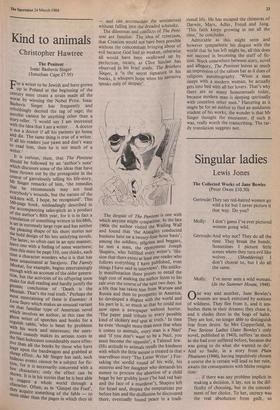Kind to animals
Christopher Hawtree
The Penitent
For a writer to be Jewish and have grown up in Poland at the beginning of the century must create a strain made all the worse by winning the Nobel Prize. Isaac Bashevis Singer has frequently and refreshingly decried the tag of sage; the novelist cannot be anything other than a story-teller. 'I would say I am interested with the idea that I am a writer... A doctor is not a doctor if all his patients go home and die. The same thing is true of a writer. If all his readers just yawn and don't want to read him, then he is not much of a writer.'
It is curious, then, that The Penitent should be followed by an 'author's note' which discusses some of the ideas that have been thrown out by the protagonist in the course of garrulously telling his life-story. Mr Singer remarks of him, 'the remedies that he recommends may not heal everybody's wounds, but the nature of the sickness will, I hope, be recognised'. This l60-page book, misleadingly described in the accompanying sales-pitch as a product of the author's 80th year, for it is in fact a translation of something written in his 68th, is set in extremely large type and has neither the pleasing shape of his short stories nor the bold design of his less satisfying novels. The latter, so often cast in an epic manner, leave one with a feeling of some weariness; then this must be page 310, one thinks, each time a character wonders who it is that has been assassinated at Sarajevo. The Family Moskat, for example, begins entertainingly enough with an account of the older genera- tion, but the activities of its offspring soon make for dull reading and hardly justify the gnomic conclusion of 'Death is the Messiah. That's the real truth.' Perhaps the most entertaining of these is Enemies: A Love Story which makes an unusual variant on that familiar type of American novel which involves an author, in this case the ghost writer of speeches and books for a roguish rabbi, who is beset by problems with his work and mistresses; the unex- pected comedy makes its serious roots in the Nazi holocaust considerably more effec- tive than all the books by those who have leapt upon the bandwagon and grabbed at
.. cheap effect. As Mr Singer has said, such
hideous events cannot be a subject for fic- tion, for it is necessarily concerned with a 'sew characters; only the effect can be
flown. It is in his stories that he is best able to suggest a whole world through a character. Often, as in `Gimpel the Fool', they acquire something of the fable — to seem older than the pages in which they sit — and can accomodate the sentimental without falling into the dreaded schmaltz.
The dilemmas and conflicts of The Peni- tent are familiar. The idea of tzimtzum, that Creation would not have been possible without the concomitant bringing about of evil because God had to weaken, otherwise all would have been swallowed up by perfection, recurs; as Clive Sinclair has observed in his brief study, The Brothers Singer, it 'is the secret signature in his books, it whispers hope when his narrative speaks only of despair'.
The despair of The Penitent is one with which anyone might sympathise. In the late 1960s the author visited the Wailing Wall and found that 'the Almighty conducted business here on a twenty-four-hour basis'; among the soldiers, pilgrims and beggars, he met a man, the eponymous Joseph Shapiro, who fulfilled every writer's 'illu- sion that there exists at least one reader who follows everything I have published, even things I have said in interviews'. His unlike- ly manifestation there proves to entail the high cost of making the author listen to his tale over the course of the next two days. In a life that has taken him from Warsaw and Russia and then to prosperity in America, he developed a disgust with the world and his part in it, so much so that he could not now open a newspaper without horror. `The paper paid tribute to every possible kind of idolatry and spat at truth.' In time he even 'thought more than once that when it comes to animals, every man is a Nazi' and 'if you don't want to be a Nazi, you must become the opposite', a Talmud Jew. (His attitude to animals recalls the kindness with which the little mouse is treated in that marvellous story 'The Letter Writer'.) For- saking the sordid round of his wife, his mistress and her daughter who demands his money to procure the abortion of a child begat by her grubby lover (`he had red hair and the face of a murderer'), Shapiro left for Israel and, despite the temptations put before him and the disillusion he discovered there, eventually found peace in a tradi-
tional life. He has escaped the chimeras of Darwin, Marx, Adler, Freud and Jung. `This faith keeps growing in me all the time,' he concludes.
Admirable as this might seem and however sympathetic his disgust with the world that he has left might be, all this does not succeed in becoming the stuff of fic- tion. Stuck somewhere between story, novel and allegory, The Penitent leaves as much an impression of the saloon bar as it does of religious autobiography. 'When a man sleeps with a modern woman, he actually gets into bed with all her lovers. That's why there are so many homosexuals today, because modern man is sleeping spiritually with countless other men.' Flattering as it might be for an author to find an assiduous student of his works, the wonder is that Mr Singer thought the encounter, if such it was, really worth the transcribing. The tar- dy translation suggests not.










































 Previous page
Previous page